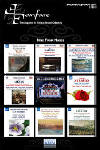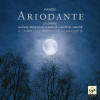Texte paru dans: / Appeared in:

Fanfare Magazine 35:3 (01-02/2012)
Pour
s'abonner / Subscription information
Les abonnés à Fanfare Magazine ont accès aux archives du
magazine sur internet.
Subscribers to Fanfare Magazine have access to the archives of the magazine
on the net.
Virgin 0708442 (3CD)

Code-barres / Barcode:
5099907084423
Consultez toutes les évaluations recensées pour ce cd
~~~~ Reach all the evaluations located for this CD
Ariodante has had a fortunate recording history, beginning with its first recording from RCA in 1971, conducted by Stephen Simon. Subsequent recordings have been conducted by Raymond Leppard (Philips, 1979), Nicholas McGegan (Harmonia Mundi, 1996), Marc Minkowski (Archiv, 1997), and Ivor Bolton (Farao, 2001). I have not heard the Bolton, but Bernard Jacobson described it as “worse than mediocre” (Fanfare 28:4). All of the others have their attractive points.
Now comes this new recording from Alan Curtis to make the purchaser’s choice even more difficult. This is by my count Curtis’s 14th Handel opera recording. Each has become one of the most, in some cases the only, recommendable recordings of that work. One would expect the same here, and Curtis does not disappoint.
Critics have hailed the cast of Minkowski’s recording as the best ever assembled for an Ariodante recording, and they are outstanding, although I am not as enamored of a couple of the voices as my colleagues. Curtis’s cast matches them voice for voice. In the title role, Joyce DiDonato matches beauty of tone and excellent technique to dramatic involvement to create a fully formed character. And this is where Curtis shows the greatest contrast to Minkowski. With Minkowski, tempos are taken to extremes. Anything marked andante or faster is taken at breakneck speeds, while slower tempos are dragged to extremes. To take a couple of examples, Ginevra’s act II aria “Il mio crudel martoro” is more than a minute longer in Minkowski’s recording, 8:19 versus 9:25. Ariodante’s act III aria “Dopo notte” is 6:45 under Minkowski, 7:22 under Curtis. At this speed, Anne Sofie von Otter, excellent as she is, can do little more than sing the notes; there is no chance for her to express Ariodante’s joy at Ginevra’s vindication.
I have previously expressed my admiration for Karina Gauvin’s Handel, and she is outstanding here as well. I can do little better than repeat what I said of her Fulvia in Curtis’s recording of Handel’s Ezio: She has “a beautiful, expressive voice and a secure technique that allows her to sing the most florid music easily, even displaying a very good trill.” Marie Nicole Lemieux well represents the scheming, morally challenged Polinesso, with excellent voice and a decent trill. Sabina Puértolas, previously unknown to me, is a soprano worth watching. She has a lovely voice and sure technique. I look forward to hearing her again. Topi Lehtipuu has an attractive voice and is engaging as Lurcanio. Matthew Brook is more than equal to the demands of his act I aria and sings all of his music well.
Curtis’s value as a conductor of Handel’s operas is by this time a known quantity. He is respectful of Handel’s score and gives excellent support to his singers. By observing Handel’s tempo indications, Curtis gives his singers the opportunity to create fully rounded emotional characters, unlike Minkowski, whose cast must cope with his insane speeds and have little opportunity to interpret what they sing. The enclosed booklet does not say what edition of the score Curtis is using. Previous recordings seem to have relied on Chrysander’s score. There are very minor differences in Curtis’s recording, differences Winton Dean discusses in Handel’s Operas: 1726–1741. One puzzling difference is a few lines of spoken recitative in act II, which surely must be wrong. As with many recordings, da capo ornamentations are incorrectly done; instead of decorating the vocal line, the “ornamentations” involve rewriting Handel’s tunes, with damage ranging from mild to butchery (“Dopo notte”). Continuo instrumentation is also mishandled. Certain instruments are assigned to individual singers, some harpsichord and cello, some theorbo or archlute. This silly practice must be a nightmare to perform and often results in chords changing instrumentation halfway through their length.
Of the previous recordings that can be recommended, two use period instruments (McGegan and Minkowski) and two modern instruments (Simon and Leppard). Simon’s RCA recording was never reissued on CD. It is well sung, with a cast including Graziella Sciutti, Carole Bogard, Sofia Steffan, Bernadette Greevy, Ian Partridge, and Marius Rintzler. It contains cuts, but it would make a valuable supplement to one of the other recordings, especially for the contributions of Greevy (Polinesso) and Partridge (Lurcanio). Leppard, the first complete recording, is well worth acquiring. With one exception, the cast is excellent: Edith Mathis, Norma Burrowes, Janet Baker, James Bowman, David Rendall, and Samuel Ramey. Baker displays more emotional involvement as Ariodante (once past the generic emotions of the first act) than anyone else who has recorded the role. Unfortunately, the recording is saddled with the hooty voice of James Bowman in a role written for a female contralto. This is the only one of these five recordings to cast Polinesso with a countertenor. Bowman’s presence keeps this recording from being my top recommendation.
Turning to the two period-instrument recordings, McGegan’s very good cast—Julia Gondek, Lisa Saffer, Jennifer Lane, Lorraine Hunt, Rufus Müller, and Nicolas Cavallier—had the advantage of performing the opera at the Göttingen Handel Festival before going into the studio for the recording. This gives them an edge in creating fully formed characters, and the cast contains no weak links. The recording also has value in giving us as an appendix alternate versions of two arias and the act II ballet music. I have been puzzled by the universal praise showered on Minkowski’s recording. Yes, the cast is excellent, and they sing beautifully. But Minkowski’s extreme tempos prevent his excellent cast from becoming emotionally involved in the characters they are portraying.
Which recording, then, should one purchase? For its all-around excellence, Curtis would be my first choice, with McGegan a close second. But I would not want to be without Leppard, especially for Baker’s portrayal. Minkowski is valuable for his outstanding group of singers, and I retain my LPs of Simon and hope, though without much expectation, for its release on CD. But Curtis jumps to the top of the list.
Cliquez l'un ou l'autre
bouton pour découvrir bien d'autres critiques de CD
Click either button for many other reviews


